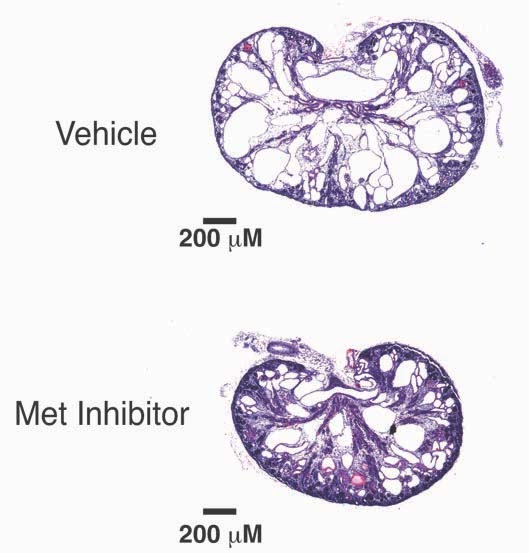A new target in polycystic kidney disease

In polycystic kidney disease, fluid-filled cysts gradually take over the kidneys, forcing patients to go on chronic dialysis — or wait for a kidney transplant. Hopes for a cure were raised when animal models showed promise in drugs inhibiting mTOR, a protein that coordinates cell growth and is over-active in PKD. But recent clinical trials brought disappointing results.
Probing deeper into the biology, Jordan Kreidberg and Shan Qin at Children’s Hospital Boston have opened up a new option. They found that the excess mTOR activation results from unwanted activity of a cell receptor called c-Met. Normally, after c-Met is activated, it is degraded, but in PKD, it never gets marked for degradation. When the researchers used an existing compound to block c-Met activity in mouse models, cysts were markedly fewer and smaller.
Kreidberg hopes that c-Met inhibitors, already being used in cancer trials, can eventually be tested in PKD patients. Since they are more specific in their action than mTOR inhibitors, they may be less toxic, and could potentially be combined with mTOR inhibitors and other drugs. “PKD is quite complex, with several regulatory pathways involved,” Kreidberg says. “It will likely benefit from sub-toxic doses of multiple agents, similar to cancer chemotherapy.” (For more: Journal of Clinical Investigation, online September 13).
Related Posts :
-

A new druggable cancer target: RNA-binding proteins on the cell surface
In 2021, research led by Ryan Flynn, MD, PhD, and his mentor, Nobel laureate Carolyn Bertozzi, PhD, opened a new chapter ...
-

Could a pill treat sickle cell disease?
The new gene therapies for sickle cell disease — including the gene-editing treatment Casgevy, based on research at Boston Children’s ...
-

Injected microbubbles could be a safe way to deliver emergency oxygen
For years, researchers and clinicians have been trying to find a way to rapidly deliver oxygen to patients when traditional ...
-

From ‘hit to vial’: Discovery and optimization of a promising vaccine adjuvant
Many vaccines are only partially effective, have waning efficacy, or do not work well in the very young or the ...





